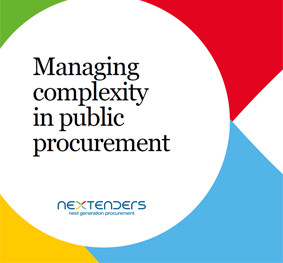 Many organisations are comfortable using eProcurement solution to run straightforward procurement activity. However, real value can be gained from adopting the same technology for complex requirements. In this blog we look at 3 way that a complex procurement process challenges your team and process.
Many organisations are comfortable using eProcurement solution to run straightforward procurement activity. However, real value can be gained from adopting the same technology for complex requirements. In this blog we look at 3 way that a complex procurement process challenges your team and process.
Increased levels of risk
Whilst it seem self-evident, it’s important to remember that with greater complexity comes greater risk. A complex requirement increases the chances of standard risks like making incorrect or unnecessary purchases or not achieving value for money. However, complexity also means that there is increased chance that suppliers fail to deliver or the goods and services aren’t of the right quality. There’s also increased risk of impropriety and/or fraud.
In our experience, complex requirements often require suppliers to be innovative. This can mean that the requirements are difficult to define precisely or they require a lot of feasibility work in advance of a specification being created. These additional dimensions of uncertainty add to the risk level. Lastly, complex projects are often high value or critical to the organisation (or both) and attract the greatest public scrutiny.
Lower levels of competition
When dealing with a complex procurement process for a major project, product or service, it’s often the case that the required work is specialised. There may only be one or two potential suppliers making competition impractical, inappropriate or not cost-effective. It also means that the specification of goods and services requires detailed development with the contractor. Choosing the right one is likely to be pivotal to success or failure.
Difficulty demonstrating value for money
Complexity can make it more difficult to measure accountability and determine how much – if any – value for money is being delivered. The sheer size and duration of some projects makes tracking and reporting time consuming and challenging. It can be further complicated by a wide distribution of information relating to the procurement activity. With mountains of data and hard deadlines to meet, regular reporting and on-going analysis too often get secondary consideration. As a result the final project review can be compromised.
To find out more about how to deal with complexity in public procurement, download our white paper now.

